OccupatiOnal therapy - Health Sciences - Curtin University
OccupatiOnal therapy - Health Sciences - Curtin University
OccupatiOnal therapy - Health Sciences - Curtin University
You also want an ePaper? Increase the reach of your titles
YUMPU automatically turns print PDFs into web optimized ePapers that Google loves.
Faculty of <strong>Health</strong> <strong>Sciences</strong><br />
Occupational<br />
Therapy<br />
Careers<br />
Graduate<br />
Profile Book
Occupational Therapy and<br />
Social Work Can Take You<br />
Places….<br />
Thank you for considering a degree in either occupational<br />
<strong>therapy</strong> (OT) or social work (SW) from <strong>Curtin</strong> <strong>University</strong>.<br />
These courses have been taught at <strong>Curtin</strong> for many years<br />
and during this time we have graduated hundreds of<br />
occupational therapists and social workers who are now<br />
employed in a range of workplaces and communities in<br />
Australia and globally.<br />
In my job as the Head of School, I am often asked what<br />
an occupational therapist or social worker does and<br />
where do they work. So we decided to put together this<br />
book to give you a taste of where a degree in OT or SW<br />
might take you.<br />
In this graduate profile book, we have also included<br />
some thoughts from employers on the valuable skills,<br />
competencies and attributes that our <strong>Curtin</strong> graduates<br />
of occupational <strong>therapy</strong> or social work bring to their<br />
workplaces. The book also highlights the impact our<br />
graduates are making in these workplaces and our<br />
community – both locally and internationally. You will<br />
note that many of the people we have highlighted have<br />
not stayed working as either occupational therapists or<br />
social workers, but have used their degrees to move to<br />
other areas of work as politicians, managers, community<br />
rehabilitation leaders and educators to name a few.<br />
Enjoy the stories and all the best for your future studies<br />
and careers.<br />
Professor Lorna Rosenwax<br />
Head, School of Occupational Therapy and Social Work<br />
For further information about our range of courses<br />
please contact:<br />
The Faculty of <strong>Health</strong> <strong>Sciences</strong><br />
School of Occupational Therapy and Social Work<br />
Email: futurestudents@health.curtin.edu.au<br />
Phone: +61 8 9266 3600<br />
Fax: +61 8 9266 3636<br />
www.ot.curtin.edu.au<br />
www.ot.curtin.edu.au
Occupational Therapy<br />
Change the World<br />
Occupational therapists are well placed to make a huge<br />
impact on the world – are you up for the challenge? As an<br />
occupational therapist you will have a range of skills and<br />
knowledge that can be applied in many settings. Many<br />
occupational therapists work with the health, disability<br />
and education sectors but more work with industry and<br />
charitable organisations.<br />
As an occupational therapist you could be working<br />
with individuals who have experienced a stroke or have<br />
depression, or a child with autism and his/her family.<br />
You could also work with a person who is homeless, a<br />
refugee or asylum seeker.<br />
When you graduate you will be working with<br />
individuals, families, groups of people or perhaps whole<br />
communities. You could even work in government or<br />
large organisations, influencing policy. Opportunities<br />
are limitless, which is what makes occupational <strong>therapy</strong><br />
such a great profession.<br />
Wherever you work and whoever you work with you<br />
will be finding ways to support people to achieve and<br />
maintain health by helping them engage in the everyday<br />
activities of their life – showering, working in a mine, or<br />
even skydiving. To enable people to participate in their<br />
chosen activities you will consider their abilities, the<br />
physical, social and legal environments, and the type<br />
of activities they want to perform. You will work with<br />
the person to find a solution that meets their needs and<br />
make it happen.<br />
This course will give you a broad introduction to<br />
occupational <strong>therapy</strong> theory and practice through<br />
coursework, practical experience and a whole year of<br />
placements in the field with occupational therapists. You<br />
will also study a range of units in topics such as health<br />
science communication, human biology, psychology,<br />
disability, clinical medicine, gerontology, psychiatry,<br />
mental health, environmental and cultural determinants<br />
of health, and counselling.<br />
www.ot.curtin.edu.au
What the Employers Say<br />
Julie Bartley, Chief Therapist<br />
Fremantle Hospital and <strong>Health</strong> Service<br />
Fremantle Hospital is a 450 bed tertiary teaching<br />
hospital. The occupational <strong>therapy</strong> service employs<br />
approximately 35 staff including occupational therapists,<br />
<strong>therapy</strong> assistants and support staff. Occupational<br />
therapists are involved in the treatment of patients in<br />
the emergency department, acute medical, surgical and<br />
orthopaedics, neurology, general rehabilitation, hand<br />
<strong>therapy</strong>, aged care, outpatient and community services.<br />
The Fremantle Hospital occupational <strong>therapy</strong> service<br />
takes approximately 20 fourth year and 120 first year<br />
<strong>Curtin</strong> <strong>University</strong> School of Occupational Therapy and<br />
Social Work students each year and is committed to the<br />
training and development of the future occupational<br />
<strong>therapy</strong> workforce. Competition for jobs with our service<br />
is keen and over the last six months we have employed<br />
six new graduates from the 2009 <strong>Curtin</strong> <strong>University</strong><br />
graduating year.<br />
Services are provided as a part of a multidisciplinary<br />
team including input from medical, nursing and other<br />
allied health professionals. There are considerable<br />
opportunities for formal education and training plus<br />
informal learning from both occupational <strong>therapy</strong><br />
colleagues and from other health professionals.<br />
Ongoing professional development is encouraged and<br />
therapists are provided with the opportunity to move<br />
into different areas within the service to develop skills<br />
and knowledge across a number of clinical areas.<br />
Working in a large occupational <strong>therapy</strong> service based<br />
in a major teaching hospital provides opportunities<br />
for career progression, as well as movement into<br />
generic posts in areas such as service coordination<br />
and project work.<br />
The Fremantle Hospital occupational <strong>therapy</strong> service<br />
prides itself in providing a friendly collegial working<br />
environment with a philosophy of mutual respect and<br />
quality service provision. We make it a priority to look<br />
after each other to ensure that we can all provide the<br />
best possible service to our patients.<br />
If you’re not afraid of hard work in a fast paced dynamic<br />
environment, consider a position with the Fremantle<br />
Hospital Occupational Therapy Service.<br />
www.ot.curtin.edu.au
What the Employers Say<br />
Wendy Hudson, Manager Policy Development<br />
& Quality Assurance<br />
Alzheimer’s Australia WA<br />
As one of the 210 full-time, part-time and casual staff<br />
employed by Alzheimer’s Australia WA you would<br />
experience a dynamic and flexible working environment<br />
where a person-centred philosophy is adopted for both<br />
staff and clients.<br />
As Australia’s oldest and largest dementia organisation,<br />
Alzheimer’s Australia WA is at the forefront of dementia<br />
care services, with world-class research, risk reduction<br />
and education and training programs designed to meet<br />
the challenge of what has been described by Access<br />
Economics as “a national dementia epidemic”.<br />
We currently employ four occupational therapists in the<br />
organisation, all of whom were trained at <strong>Curtin</strong>. One<br />
of them was employed after she graduated, after she<br />
had a placement with us, and also worked in our day<br />
centre whilst she was studying. For many years we have<br />
been offering placement opportunities to occupational<br />
therapists and other health sciences, media and PR<br />
students from <strong>Curtin</strong> and other universities. We also<br />
provide job opportunities, both paid and volunteering for<br />
students during their studies.<br />
Alzheimer’s Australia WA believes in the value of its<br />
people and is committed to investing in its staff to<br />
develop their skills and talents to ensure its programs<br />
and services are of the highest quality.<br />
www.ot.curtin.edu.au
Graduate Destinations –<br />
Occupational Therapy<br />
The career options available to graduates are diverse<br />
and wide-ranging. The list below provides a snapshot of<br />
some of the job destinations and job titles of graduates<br />
that have entered the workforce. Have a read through<br />
this graduate profile book to find out about some of the<br />
wonderful career pathways and opportunities that our<br />
graduates have followed.<br />
Employers<br />
Ability Plus<br />
Advanced Personnel Management<br />
Aegis<br />
Alzheimer’s Australia<br />
Argyle Diamonds<br />
Armadale <strong>Health</strong> Services<br />
Autism Association of WA<br />
Bentley Hospital<br />
Centrelink<br />
<strong>Curtin</strong> <strong>University</strong><br />
Department of <strong>Health</strong><br />
Department of the Attorney General (Office of the Public<br />
Advocate)<br />
Disability Services Commission<br />
Eastern Wheatbelt Primary <strong>Health</strong><br />
Edge Employment Solutions<br />
Fremantle Hospital<br />
Hand & Upper Limb Centre<br />
<strong>Health</strong> Central Occupational Therapy International<br />
<strong>Health</strong> Corporate Network (Government)<br />
Joondalup <strong>Health</strong> Campus<br />
Kununurra Hospital<br />
Life Live It! Occupational Therapy<br />
Maximum Independence Occupational Therapy<br />
Osborne Park Older Adult Mental <strong>Health</strong> Service<br />
PeopleSense Pty Ltd<br />
Princess Margaret Hospital<br />
Rio Tinto<br />
Rockingham General Hospital<br />
Rocky Bay Inc<br />
Royal Perth Hospital<br />
Sir Charles Gairdner Hospital<br />
South Metropolitan <strong>Health</strong> Services<br />
State Child Development Centre<br />
Therapy Focus<br />
WA Country <strong>Health</strong> Service<br />
Workfocus Australia<br />
Job Titles<br />
<strong>Health</strong> & Safety Officer<br />
Intervention Assistant<br />
Job Coordinator<br />
Injury Management Consultant<br />
Lecturer<br />
Local Area Coordinator<br />
Manager<br />
Mental <strong>Health</strong> Rehabilitation Practitioner<br />
Occupational Therapist<br />
Occupational <strong>Health</strong> & Safety Advisor<br />
Rehabilitation Consultant<br />
Research Assistant<br />
www.ot.curtin.edu.au
Sean Ashton<br />
<strong>Health</strong> Coordinator, Neptune<br />
Marine Services<br />
BSc (Sport Sci) (2006) MOT<br />
(<strong>Curtin</strong>) (2008)<br />
After finishing my OT degree at <strong>Curtin</strong> <strong>University</strong> I<br />
started working at Sir Charles Gairdner Hospital as an<br />
occupational therapist on the orthopaedics ward. This<br />
experience was invaluable as it helped to consolidate<br />
all the clinical skills I had learnt whilst studying. The<br />
environment at the hospital was very supportive and<br />
helped me transition to full-time work.<br />
I was given the opportunity to work in the energy<br />
sector, and currently work as a health coordinator for<br />
an underwater oil and gas services company. My role is<br />
very diverse and I get the opportunity to put into practise<br />
many of the skills I have learnt.<br />
My primary role is injury management which involves<br />
assisting employees who are hurt at work return to their<br />
pre-injury jobs. Monitoring the trends and statistics from<br />
our workforce allows me to develop and promote health<br />
programs, ensuring the workplace is more proactive in its<br />
approach to preventing injuries.<br />
My role is very diverse, involving liaising with doctors,<br />
injured workers, clients and colleagues. My workplace<br />
is very flexible and dynamic and allows me time for<br />
professional as well as personal development.<br />
The biggest thing that I took away from my occupational<br />
<strong>therapy</strong> studies was the skill in providing effective and<br />
meaningful solutions to complex health problems.<br />
Enabling people to participate in activities that are<br />
important to them and achieving real and tangible<br />
results is a highly sought after skill in the workplace.<br />
My best piece of advice to potential occupational <strong>therapy</strong><br />
students is to work hard so that you understand the<br />
material, but of equal importance is to invest time<br />
in people – listen and engage people and develop a<br />
professional network. The skills you gain will be able to<br />
take you into any industry.<br />
www.ot.curtin.edu.au
Michael Fitzgerald<br />
Head Therapist, Business<br />
Owner, In Hand Therapy<br />
BA (1994), BSc (<strong>Curtin</strong>) (1999),<br />
MAHTA<br />
I graduated with an occupational <strong>therapy</strong> degree from<br />
<strong>Curtin</strong> <strong>University</strong>, having previously completed a four<br />
year degree in fine arts. I have specialised in hand<br />
<strong>therapy</strong> for ten years now, and am a full member of the<br />
Australian Hand Therapy Association.<br />
I have always had a strong interest in teaching and have<br />
tutored hand and upper limb splinting and am a guest<br />
lecturer in the occupational <strong>therapy</strong> course at <strong>Curtin</strong><br />
<strong>University</strong>.<br />
I began my hand <strong>therapy</strong> career working under Mr<br />
Jeff Eckers of Western Orthopaedics for seven years,<br />
becoming manager of that practice before spending two<br />
years in a partnership with two plastic surgeons. Both of<br />
these practices specialise in the treatment of hand and<br />
upper limb trauma.<br />
Additionally I have been employed part-time at Princess<br />
Margaret Hospital from 2007-2009 treating primarily<br />
upper limb tone and juvenile arthritis.<br />
I started my own practice, Inhand Occupational Therapy,<br />
in Claremont a year ago, and now employ two other parttime<br />
therapists. This has given me the opportunity to<br />
consider restarting my arts career.<br />
www.ot.curtin.edu.au
Robyn Della Franca<br />
Lecturer: School of<br />
Occupational Therapy and<br />
Social Work <strong>Curtin</strong> <strong>University</strong><br />
BSc (<strong>Curtin</strong>) (1994)<br />
After completing my occupational <strong>therapy</strong> (OT) degree<br />
at <strong>Curtin</strong> <strong>University</strong>, I worked in Perth for a short time<br />
before heading to work in the United Kingdom. After<br />
spending time as a community occupational therapist in<br />
the isolated and beautiful Isle of Man I moved to London<br />
to work at Great Ormond Street Children’s Hospital. It<br />
was whilst working there that I was fortunate enough to<br />
meet the late Princess Diana and work with some of the<br />
best health professionals in Europe.<br />
Later my career led me to the community in the east end<br />
of London where I completed daily home visits aboard<br />
double decker buses carrying an array of OT equipment<br />
including bath boards and shower stools. During this<br />
time I also managed to spend three very memorable<br />
months travelling through Europe with OT friends from<br />
university in an old campervan. I later returned to spend<br />
a year working as a sole practitioner in Scotland on the<br />
Isle of Bute in 2005, where I completed home visits in<br />
the snow and sleet, tried eating haggis and spent time<br />
exploring the highlands.<br />
Back home in Perth, I have had a variety of jobs including<br />
working with the Disability Services Commission flying<br />
to rural and remote Western Australia, and supporting<br />
country therapists working with people with complex<br />
needs.<br />
I have also been fortunate enough to work in the area of<br />
advocacy at the Ethnic Disability Advocacy Centre where<br />
I co-facilitated the Vicinity Film project supporting film<br />
makers with disabilities.<br />
More recently I have returned to <strong>Curtin</strong> <strong>University</strong> to<br />
the School of Occupational Therapy and Social Work to<br />
teach. I have also begun my Masters which I am sure will<br />
keep me busy for the next few years.<br />
My OT qualification has allowed me to quite literally<br />
travel the world working in culturally diverse and<br />
rewarding environments with some truly amazing<br />
people.<br />
www.ot.curtin.edu.au
Sue Beurteaux<br />
Business Partner, GYMWORKS<br />
Occupational Therapy Services<br />
B App Sc (<strong>Curtin</strong>) (1984)<br />
Two years after graduating from occupational <strong>therapy</strong><br />
(OT) in 1984 I found my real passion for working in<br />
Paediatrics. Until then I was learning a lot about working<br />
in a hospital and in teams, but when I commenced work<br />
at Princess Margaret Hospital (PMH) in the burns unit,<br />
I found my “home”. Working for ten years at PMH, both<br />
on the burns unit and later with the babies in early<br />
intervention, has offered a challenge in the myriad of<br />
skills I needed to develop to manage a very varied and<br />
ever evolving case load.<br />
No chance to get bored or complacent in the job. There<br />
has always been a need and desire to keep developing<br />
expertise and I like that my search for new techniques<br />
and strategies has not diminished over the years. OT has<br />
been a perfect match as I don’t like to get bored and hate<br />
the feeling that everything is the same. The challenge<br />
and variety is the best part of being an occupational<br />
therapist.<br />
I changed direction in 1998 and helped develop the<br />
Talkabout program for children with speech and<br />
language difficulties at the Telethon Speech and Hearing<br />
Centre. The program now has four playgroups, three<br />
kindergartens and three pre-primary streams.<br />
For the last ten years I have run a successful private<br />
practice “Gymworks”, and this has required a completely<br />
different set of skills and is a new direction in my career.<br />
My colleague Helen and I now employ six occupational<br />
therapists and see over 100 children in a practice that is<br />
dedicated to improving their performance in all aspects<br />
of their lives. We have an amazing purpose-built gym<br />
and I spend part of my working day on a flying fox with<br />
the most rewarding clients – children. No sedentary<br />
office chair life for me.<br />
At 18 I wasn’t always sure of what I wanted to do but<br />
now after 25 years of work I have to pinch myself, to<br />
truly believe I chose the best career ever – OT.<br />
www.ot.curtin.edu.au
Hon Helen Morton MLC<br />
Assoc Dip OT<br />
Member for East Metropolitan<br />
Region, Parliamentary Secretary<br />
to the Premier; Treasurer;<br />
Minister for State Development<br />
and to the Minister for Water;<br />
Mental <strong>Health</strong>.<br />
Assoc Dip OT (<strong>Curtin</strong>) (1969)<br />
After graduating from the occupational <strong>therapy</strong> program<br />
at the Western Australian Institute of Technology<br />
(WAIT), now known as <strong>Curtin</strong> <strong>University</strong>, I worked as<br />
an occupational therapist (OT) in mental health and<br />
pioneered private practice occupational <strong>therapy</strong> in mental<br />
health in Western Australia.<br />
My career took me into senior executive positions in<br />
the West Australian <strong>Health</strong> Service including: Regional<br />
Director of Central Wheatbelt, Midwest and Gascoyne<br />
<strong>Health</strong> Services; Director of South Metropolitan <strong>Health</strong><br />
Authority; General Manager Finance and Resources,<br />
<strong>Health</strong> Department of Western Australia; General Manager<br />
Armadale <strong>Health</strong> Service and Chief Executive Officer of<br />
Kalamunda Community Care.<br />
Mental <strong>Health</strong> has been my passion and has seen me play<br />
an instrumental role in designing, building and managing<br />
the full spectrum of public mental health services across<br />
country and metropolitan areas before embarking on a<br />
political career.<br />
As the upper house Member for the East Metropolitan<br />
Region, I have continued to dedicate my time to reforming<br />
mental health services in WA – originally as the Shadow<br />
Minister for Mental <strong>Health</strong> and now as Parliamentary<br />
Secretary to the Minister for Mental <strong>Health</strong>.<br />
I am proud to be the driving force behind the new Mental<br />
<strong>Health</strong> Commission here in WA. At the end of the day, I<br />
want to make sure that people with a mental illness are<br />
given a fair go.<br />
As a Member of the Legislative Council, I am responsible<br />
for reviewing and amending Bills that become Western<br />
Australian law. As the Parliamentary Secretary to the<br />
Premier; Treasurer; Minister for State Development, as<br />
well as to the Minister for Water; Mental <strong>Health</strong>, I am<br />
responsible for handling the Government’s legislation in<br />
these portfolios in the upper house, along with relevant<br />
questions, motions and committee hearings.<br />
This role also sees me representing the Premier and<br />
Minister at a wide range of events. I have recently been in<br />
the Netherlands leading the Western Australian delegation<br />
bid for the world’s multi-billion radioastronomy facility -<br />
the Square Kilometre Array.<br />
The issues brought to my attention by constituents in<br />
my large constituency (stretching from West Swan to<br />
Pinjarra) are many and varied.<br />
I truly believe that the same personal qualities that<br />
motivated me to become an OT are precisely the same<br />
qualities that have driven my political career; I honestly<br />
want to see individuals and communities have better<br />
outcomes and opportunities.<br />
www.ot.curtin.edu.au
Cathy Thomas<br />
Specialised Hand Therapy<br />
Services<br />
B App Sc (OT) (<strong>Curtin</strong>) (1985)<br />
I graduated as an occupational therapist in 1985 from<br />
<strong>Curtin</strong> <strong>University</strong>. Over the past 20 years I have worked<br />
in a variety of practice settings including the public<br />
hospital system, Department of Veterans Affairs and<br />
private clinics before starting my own private practice in<br />
1995, specialising in the rehabilitation of hand and upper<br />
limb injuries. When Liz Saleeba joined me in partnership<br />
in 1998, Thomas and Saleeba Occupational Therapy<br />
Specialised Hand Therapy Services was established.<br />
I have a Postgraduate Diploma in Hand and Upper Limb<br />
Rehabilitation (1994) and have been a member of the<br />
Australian Hand Therapy Association (AHTA) for over<br />
15 years. I have been the recipient of the Jill Chapman<br />
Award for the best Clinical Paper at AHTA National<br />
Conferences on two occasions and have published in<br />
the American Journal of Hand Therapy. I also took the<br />
opportunity to lecture and tutor in Hand and Upper Limb<br />
Rehabilitation, Biomechanics and Kinesiology at <strong>Curtin</strong><br />
<strong>University</strong>, and I am frequently asked to give talks and<br />
lectures in my field of expertise. I am also an active<br />
committee member for the professional association, OT<br />
Australia WA.<br />
www.ot.curtin.edu.au
Elizabeth Saleeba<br />
Specialised Hand Therapy<br />
Services<br />
B App Sc (OT) (<strong>Curtin</strong>) (1994)<br />
After graduating I worked in the area of hand <strong>therapy</strong><br />
for 15 years. I worked in a variety of hand clinics in both<br />
Perth and Sydney before forming a partnership with<br />
Cathy Thomas in 1998 and establishing Thomas and<br />
Saleeba Occupational Therapy Specialised Hand Therapy<br />
Services.<br />
I have also tutored students at <strong>Curtin</strong> <strong>University</strong><br />
and have completed my Masters of Medical Science<br />
(2010) research at the <strong>University</strong> of Western Australia<br />
on Patient Compliance and Spontaneous Movement<br />
following Flexor Tendon Repair. I presented this study at<br />
the AHTA conference held in Perth where my presentation<br />
received the Australian Hand Surgery Society Award.<br />
I have published an article in the American Journal of<br />
Hand Therapy, which also won the Jill Chapman award at<br />
the AHTA conference held in New Zealand. I have been a<br />
full member of the Australian Hand Therapy Association<br />
(AHTA) for over ten years.<br />
www.ot.curtin.edu.au
Daniel Hitchcock<br />
Program Manager, Sir Charles<br />
Gairdner Hospital, Four Hour<br />
Rule Program<br />
BSc (Occupational Therapy)/<br />
Bachelor Business<br />
Administration (<strong>Curtin</strong>) (2005)<br />
Upon completion of my occupational <strong>therapy</strong><br />
undergraduate studies at <strong>Curtin</strong> <strong>University</strong> in 2005, I was<br />
offered a six week contract to cover annual leave in the<br />
Hand & Upper Limb Clinic at Sir Charles Gairdner Hospital<br />
(SCGH). This contract was extended over a number of<br />
years, allowing me to experience many clinical areas<br />
across both in and outpatient services at SCGH.<br />
The experience I gained across these clinical areas<br />
provided the foundation for me to be involved in a<br />
number of service improvement projects, aimed at<br />
improving the way a patient’s care was planned and<br />
managed through the hospital. I now lead a project that<br />
is increasing the safety, timeliness and quality of care<br />
delivered to each of the 56,000 patients that present to<br />
the SCGH Emergency Department (ED) every year.<br />
As well as ensuring compliance with a suite of quality<br />
and safety measures, the program is aimed at ensuring<br />
that every patient can either be discharged from the ED,<br />
or admitted to a bed within four hours of presentation.<br />
The role requires working with representatives from<br />
across the 3,500 strong workforce to identify ways that<br />
work processes can be redesigned to improve the journey<br />
experienced by patients.<br />
An occupational <strong>therapy</strong> background is ideally suited<br />
for leading process redesign, as the foundation skills in<br />
assessment, activity analysis and group facilitation,<br />
are easily transferable from assessing the needs of an<br />
individual patient, to looking at a needs and potential<br />
improvements of a system.<br />
www.ot.curtin.edu.au
Dawn Anderson<br />
Lecturer, Occupational<br />
Therapy, Edith Cowan<br />
<strong>University</strong><br />
BSc (OT) (<strong>Curtin</strong>) (1999)<br />
There haven’t been many days that go by where I<br />
haven’t been exceedingly grateful that I chose to study<br />
occupational <strong>therapy</strong> at <strong>Curtin</strong> <strong>University</strong>. It has taken<br />
me all around Australia, from working in hospitals, to<br />
establishing videoconferencing programs for health<br />
professionals, to visiting rural and remote communities,<br />
to speaking at conferences. The opportunities have been<br />
amazing. When your backyard is the Great Barrier Reef,<br />
Kakadu National Park, the Margaret River Wine Region<br />
or the Daintree National Park, there is always plenty to<br />
explore and discover.<br />
Occupational <strong>therapy</strong> has even taken me to rural Africa,<br />
where I spent two years establishing a program for<br />
people with disabilities in remote villages. The training<br />
I received from studying OT enabled me to successfully<br />
utilise my Australian experiences and skills in an African<br />
context with amazing results. I made splints over gas<br />
hotplates, fixed wheelchairs with my pocket knife, and<br />
used plastic buckets for just about every use you can<br />
imagine. I rode horses along Lake Malawi, made pottery<br />
at a local village and learned how to shop at the markets<br />
without having to use English. All in all, a truly life<br />
changing two years.<br />
Now that I am back in Australia, I am lecturing in OT to<br />
undergraduate students at Edith Cowan <strong>University</strong>, in<br />
the areas of professional practice and ‘Occupation and<br />
Equity’. It is such a privilege to be involved with educating<br />
our up and coming OTs in a field that I am so passionate<br />
about and view with such regard. The best part is that<br />
I get to talk about all of the amazing experiences that<br />
being an OT has afforded me. The skills you develop<br />
as an OT really do give you a passport to the world.<br />
They give you fresh eyes with which to view the world,<br />
and they enable you to be relevant and useful in many<br />
different contexts.<br />
Since becoming an OT, I’ve met the most amazing,<br />
inspiring and fascinating people. I’ve been challenged<br />
to continue to grow and develop as a person and as a<br />
professional. And I can’t wait for the rest of this fantastic<br />
journey to reveal itself.<br />
www.ot.curtin.edu.au
Heather Freegard<br />
Coordinator, WA Dementia<br />
Training Study Centre<br />
<strong>Curtin</strong> Centre for Research on<br />
Ageing<br />
Ass.OT (1970), BAppScOT (WAIT<br />
now <strong>Curtin</strong>) (1986), MSocSc<br />
(Human Services) (2000)<br />
My sixth ‘career’ as coordinator WA Dementia Training<br />
Study Centre at <strong>Curtin</strong> Centre for Research on Ageing has<br />
just begun and requires all the experience, expertise and<br />
wisdom I developed during the previous five; clinical skills<br />
working with adults and children with disability; working<br />
with elders, especially people with dementia, living in the<br />
community and residential care; conducting professional<br />
development programs in dementia care; and the<br />
fostering of undergraduate and postgraduate students<br />
at the <strong>Curtin</strong> School of Occupational Therapy and Social<br />
Work in the areas of gerontology and ethics.<br />
Along the way I have had opportunities to develop<br />
recognised expertise as a Churchill Fellow, and serve<br />
my profession as a member of the WA Occupational<br />
Therapists Registration Board and as author/editor of a<br />
textbook on professional ethical practice.<br />
My newest adventure requires me to work with all<br />
health professionals by providing and brokering training<br />
opportunities that encourage a career path for people<br />
passionate about advocating for and working with people<br />
with dementia. Doctoral studies combining my interests<br />
of ethics and dementia are progressing well.<br />
My occupational <strong>therapy</strong> qualification has created many<br />
opportunities for continued challenge and growth while<br />
balancing the varying demands of child care and parent<br />
care. Age is no barrier.<br />
www.ot.curtin.edu.au
Rebecca Thompson<br />
Principal Occupational<br />
Therapist, Maximum<br />
Independence Occupational<br />
Therapy (MIOT) and<br />
Independent Occupational<br />
Therapy Services (IOTS)<br />
BSc (<strong>Curtin</strong>) (1993)<br />
Following my graduation from <strong>Curtin</strong> <strong>University</strong> I worked<br />
as an occupational therapist in mental health. This<br />
experience provided me with a very solid foundation<br />
for all my future career opportunities, as it assisted me<br />
to develop a more in depth understanding of people,<br />
dynamics and the power of communication.<br />
After three years working in mental health, I took up a<br />
completely different position in home visiting at Royal<br />
Perth Hospital (RPH). My next clinical challenge was in<br />
spinal rehabilitation, an area that is still my primary<br />
clinical interest. Then, after a period of maternity leave,<br />
I took up a part-time position with the RPH Aged Care<br />
Assessment Team (ACAT). While in this position, I<br />
began exploring the option of a private practice in home<br />
visiting, and in 2002 formed Maximum Independence<br />
Occupational Therapy (MIOT).<br />
In 2003, I left the ACAT team to have my second child,<br />
and so I employed MIOTs first staff member. MIOT<br />
now employs several OTs covering clinical areas of<br />
home visiting, acute hospital and complex community<br />
rehabilitation for severely injured clients. MIOT also<br />
employs a social worker, and administrative support<br />
staff.<br />
In 2008, I purchased Independent Occupational Therapy<br />
Services (IOTS), which means we now offer medico-legal<br />
assessments and report writing as another client service,<br />
and clinical option for our more experienced OTs.<br />
I continue to work part-time at both practices,<br />
although my role now is mostly managerial and clinical<br />
consultation. The last 17 years of practice has provided<br />
me with enormously varied opportunities for clinical<br />
learning, and a huge amount of challenges. I believe my<br />
training in OT (particularly task and activity analysis)<br />
has assisted me greatly in the management of the<br />
businesses and with planning for growth and expansion.<br />
I feel very fortunate to have had the greatly varied<br />
opportunities that the OT profession has provided me,<br />
and I look forward to whatever the future holds. I now<br />
volunteer for the OT Australia WA in an effort to ensure<br />
the profession remains strong for future OTs.<br />
OT is a great career for anyone wanting to work with<br />
people, in a profession that offers a huge variety of<br />
clinical and managerial opportunities. Best of luck to<br />
anyone considering this career path.<br />
www.ot.curtin.edu.au
Geoff Hooke<br />
Director of Information<br />
Technology<br />
Perth Clinic<br />
BSc (<strong>Curtin</strong>, formerly, WA<br />
Institute of Technology) (1980)<br />
Since graduating with my degree in occupational<br />
<strong>therapy</strong>, I have specialised in mental health, working at<br />
Sir Charles Gairdner Hospital and now at Perth Clinic.<br />
My current job involves various roles that have me<br />
working clinically, as well as directing all the information<br />
technology services. I am also the Chair of the Clinical<br />
Improvement Team. This mixed role is very rewarding<br />
and allows me to implement world-leading clinical<br />
strategies that utilise IT concepts, and assists in the<br />
training of students.<br />
As a team we have just instituted a program that sees<br />
Perth Clinic monitoring the progress of inpatient care<br />
utilising a daily questionnaire. These are reviewed at<br />
least weekly, in group settings and in collaboration<br />
with treatment plans, using a real time electronic data<br />
system that features touch screen entry. The patients<br />
are provided with feedback against expected treatment<br />
outcomes in graphical form. This live system provides<br />
the capacity to show individual patients responses from<br />
the point of care. These are available around the hospital<br />
for nurses and other treatment team members to refer to<br />
as required.<br />
My OT degree has allowed me to have an enjoyable<br />
career that has involved me making international and<br />
national presentations, and authoring over ten peerreviewed<br />
publications in professional journals.<br />
It is wonderful to be contributing to the development of<br />
new strategies that progress and promote the field of<br />
mental health and occupational <strong>therapy</strong>.<br />
www.ot.curtin.edu.au
Setareh Ghahari<br />
Senior Research Fellow, School<br />
of Occupational Therapy and<br />
Social Work, <strong>Curtin</strong> <strong>University</strong><br />
BSc(OT) (1994) (Iran Medical<br />
<strong>University</strong>), MSc(OT) (1997)<br />
(<strong>University</strong> of Social Welfare &<br />
Rehabilitation <strong>Sciences</strong>, PhD<br />
(2009) (<strong>Curtin</strong>)<br />
I have worked as an occupational therapist with adults<br />
with neurological dysfunctions for more than 12 years<br />
since I got my Bachelor’s degree in 1994. I have also<br />
lectured at the Department of Occupational Therapy<br />
in the <strong>University</strong> of Social Welfare and Rehabilitation<br />
<strong>Sciences</strong>, Tehran, Iran. When I finished my Masters<br />
degree in occupational <strong>therapy</strong>, I had the privilege<br />
to supervise students and continue teaching in the<br />
university. I have presented at more than 15 national<br />
and international conferences during my academic<br />
career in Iran. I was promoted to a senior lecturer<br />
position before I moved to Australia in 2005 to<br />
commence a PhD. In coming to Australia, I experienced a<br />
different and interesting academic life and learned much<br />
from the Australian culture.<br />
My PhD thesis gave me the experience of how to deal<br />
with different research problems. I was awarded a grant<br />
by the Multiple Sclerosis Society of WA to work on my<br />
PhD, which was awarded on February 2009. So far, I have<br />
had two articles published in high peer-reviewed journals<br />
and several presentations in Australian and international<br />
conferences based on my PhD project.<br />
From the time I graduated from my PhD, I have become<br />
more and more adept at keeping lots of balls in the air!<br />
Working as a Senior Research Fellow within the School<br />
of Occupational Therapy and Social Work at <strong>Curtin</strong><br />
<strong>University</strong> pushed me even harder to learn important<br />
academic skills: managing staff on different projects,<br />
meeting deadlines for different projects, writing grant<br />
applications and journal articles and working with<br />
different people with different working styles were all<br />
interesting challenges for me.<br />
The hardest part of my job is and has always been<br />
the language. Using English as the second language<br />
sometimes makes it difficult to move forward, but on<br />
the bright side, I always get ample support from the<br />
other staff members in the school. My plan is to continue<br />
working as an academic especially as a researcher. I love<br />
doing research in the area of occupational <strong>therapy</strong> which<br />
provides me the opportunity to use both my clinical and<br />
research skills.<br />
www.ot.curtin.edu.au
Belinda Cobcroft<br />
Proprietor, Cornwall House<br />
Occupational Therapy<br />
BSc (<strong>Curtin</strong>) (2008), Dip TA<br />
The journey into life as an occupational therapist, for<br />
me, first began when my middle child fractured his<br />
wrist; he fell off the top of a wheelie bin and landed<br />
rather awkwardly on a broom. He was in year one and<br />
was just learning to master the art of handwriting. Six<br />
weeks in plaster had a negative effect on the strength<br />
of his developing muscles, leaving his wrist weak. As<br />
such, handwriting took a back seat. We were referred<br />
to occupational <strong>therapy</strong> (OT). Those next ten weeks<br />
changed my life.<br />
At the time I had almost completed a teaching degree<br />
as a mature age student and was working as a teacher’s<br />
assistant for children with learning difficulties. I was<br />
looking forward to completing my degree, but before I<br />
knew it I had applied for another degree, a Bachelor of<br />
Science in Occupational Therapy at <strong>Curtin</strong> <strong>University</strong>.<br />
For me the opportunity to work closely with people of<br />
all ages with varying levels of function, physically and<br />
mentally meant much greater opportunity, knowledge<br />
and work satisfaction.<br />
Over the next four years I began to understand OT to be<br />
amazingly diverse. OT is about assisting people achieve<br />
and maintain their independence, skill and ability in<br />
their day to day activities. Therapists work to encourage<br />
and understand others, provide opportunities, promote<br />
health and development, support other services, support<br />
and educate clients and their families and carers and we<br />
are a key member of health care teams.<br />
As an occupational therapist you will have a range<br />
of skills and knowledge that can be applied in many<br />
settings. Occupational therapists are found in the<br />
health, disability and education sectors, industry<br />
and not-for-profit organisations. I now have a much<br />
greater understanding of the underpinning factors that<br />
determine health and development and know how I can<br />
directly influence these or assist with change. There is<br />
nothing more rewarding than to see a person reach their<br />
greatest potential; this has a ripple effect.<br />
www.ot.curtin.edu.au
John Harmsen<br />
Occupational Therapist,<br />
Independent Living Centre WA<br />
Project Manager, <strong>Curtin</strong><br />
<strong>University</strong> School of<br />
Occupational Therapy and<br />
Social Work, Centre for Research<br />
into Disability and Society<br />
BSc (<strong>Curtin</strong>) (2002)<br />
Upon graduation from <strong>Curtin</strong> <strong>University</strong> in 2002, I<br />
commenced a position with Therapy Focus and Disability<br />
Service Commission (School Age Therapy Services)<br />
providing <strong>therapy</strong> services to school aged children who<br />
have a disability. After 18 months I began looking<br />
for my next challenge and assisted in establishing<br />
an occupational <strong>therapy</strong> service with a private multidisciplinary<br />
paediatric <strong>therapy</strong> practice.<br />
Further opportunities and experiences have presented<br />
themselves along my career path, including developing<br />
a postural support seating assessment tool, travelling<br />
around Western Australia with the Country Resource and<br />
Consultancy Therapy Team and the Independent Living<br />
Centre Tech Team, working for Invacare Australia, and<br />
more recently returning to <strong>Curtin</strong> <strong>University</strong>’s School<br />
of Occupational Therapy and Social Work to complete<br />
a research project investigating the role and impact of<br />
home and community care services.<br />
Across my career I have had opportunities to present at<br />
conferences and workshops, and I was fortunate enough<br />
to receive a Ray Young Scholarship from the Disability<br />
Services Commission which allowed me to travel across<br />
Australia to compare the different services provided to<br />
people who have a disability in rural and remote areas.<br />
My occupational <strong>therapy</strong> degree from <strong>Curtin</strong> equipped<br />
me with a range of skills that have served me well in the<br />
real world. I love the challenges that I face on a daily<br />
basis and know that I am making a difference in people’s<br />
lives. I always valued my time studying at <strong>Curtin</strong>; not<br />
only for giving me a fantastic degree, but also for the<br />
people I met during my studies including my wife Bree.<br />
Occupational <strong>therapy</strong> is a great career choice that offers<br />
a wide range of opportunities and experiences.<br />
www.ot.curtin.edu.au
Carolyn Webster<br />
Manager, Community and<br />
Regulatory Services, Shire of<br />
Wagin<br />
Dip Occ Therapy; B Hlth Sc<br />
(<strong>Curtin</strong>) (1963) and Grad Adv<br />
Mgt Prog (UWA)<br />
I was one of seven graduates from the first school of<br />
Occupational Therapy in Western Australia (WA) and<br />
later undertook degree completion studies at the School<br />
of Occupational Therapy, <strong>Curtin</strong> <strong>University</strong>. Having<br />
worked as a clinician in both physical and psychiatric<br />
rehabilitation I lectured at the Occupational Therapy<br />
School and then worked as the Chief Occupational<br />
Therapist at Sir Charles Gairdner Hospital (SCGH).<br />
From SCGH I was seconded to the Public Service<br />
Commission to head the State Task Force in overuse<br />
injury and stayed on to become a policy officer in<br />
occupational safety and health. At that time I was<br />
fortunate to be selected for the Executive Development<br />
Year Program which included a number of secondments<br />
and the completion of an Advanced Management<br />
Program at a local university.<br />
I worked as a consultant to the Police Commissioner and<br />
his executive team and then moved to become Director<br />
of Social Policy and Social Justice in the Department of<br />
Premier and Cabinet. Later I worked as assistant director<br />
Medical and Specialist Services at the Disability Services<br />
Commission and Manager Access and Improvement.<br />
I left WA to work for five years in Kenya as director of<br />
an East African non-Government organisation. Upon<br />
returning to Australia I worked as principal policy<br />
officer of WorkCover WA and then as senior therapist<br />
for the Southern Wheatbelt in WA Country <strong>Health</strong>.<br />
Recently I was appointed to my current post of manager,<br />
Community and Regulatory Services, Shire of Wagin.<br />
All these positions have been possible due to my<br />
undergraduate education at <strong>Curtin</strong> <strong>University</strong>. I<br />
continually use the many skills and acquired knowledge<br />
that my studies in occupational <strong>therapy</strong> gave me. I have<br />
adopted a lifelong learning ethic and have remained<br />
close to my professional roots through involvement<br />
at local, state and international levels of professional<br />
associations. As national President I became very aware<br />
of the role Australian therapists played across the world<br />
and later went on to become President of the World<br />
Federation of Occupational Therapists. This position<br />
allowed me to make some significant inroads into the<br />
development of the profession in many countries.<br />
In parallel with all of the above, I have also been a wife,<br />
mother and grandmother. I believe that my work as a<br />
health professional equipped me with special abilities in<br />
these life roles. I continue to mentor others and promote<br />
the values of study and work in the health sciences.<br />
www.ot.curtin.edu.au
Alex Hitchcock<br />
Shenton Park Rehabilitation<br />
Centre, Royal Perth Hospital<br />
BSc (<strong>Curtin</strong>) (2008)<br />
Following graduation from the School of Occupational<br />
Therapy at <strong>Curtin</strong> <strong>University</strong>, I was lucky enough to get<br />
an occupational therapist position with Royal Perth<br />
Hospital at the Shenton Park Rehabilitation Campus.<br />
Since then I have had an extended rotation on the State<br />
Acquired Brain Injury Rehabilitation Service Unit. My role<br />
involves working with people following an acquired brain<br />
injury as a result of a traumatic injury, such as a car<br />
accident or a vascular accident requiring brain surgery.<br />
I appreciate the variety of patients I get to work with,<br />
some requiring months of daily rehabilitation to<br />
achieve goals. Primarily, I see patients displaying<br />
cognitive deficits, which limit their ability to care for<br />
themselves. However, they commonly have physical<br />
and communicative deficits as well, which necessitates<br />
working closely with the entire multidisciplinary team.<br />
It is a wonderful experience to be involved in a patient’s<br />
treatment that enables them to achieve a meaningful<br />
goal which may have seemed unachievable to them<br />
and their family, such as writing their name, getting<br />
showered and dressed independently or cooking a meal.<br />
I personally feel the best reward comes from seeing a<br />
previously highly dependent patient returning home to<br />
lead a normal life with their family.<br />
I have recently had the opportunity to diversify my skills<br />
by spending time in the occupational <strong>therapy</strong> upper<br />
limb unit, and so I have hit the books again to review my<br />
anatomy and splinting techniques. Having completed<br />
my first splint on a patient yesterday, I am relishing<br />
the opportunity to expand my knowledge and skill base.<br />
I find the variety of work available for occupational<br />
therapists amazes me and is one of the best aspects of<br />
the job. Catching up with university colleagues always<br />
leads to in-depth discussions on the diverse industries<br />
and client groups that we now see as professionals.<br />
So, what does the future hold? I am planning on heading<br />
to the United Kingdom to work for a few years, joining<br />
the great procession of occupational therapists getting<br />
experience overseas before heading home with a greater<br />
wealth of knowledge.<br />
www.ot.curtin.edu.au
Julie Bartley<br />
Chief Occupational Therapist,<br />
Fremantle Hospital and <strong>Health</strong><br />
Service<br />
B App Sc OT (<strong>Curtin</strong>) (1990),<br />
Grad Dip <strong>Health</strong> Administration<br />
(2002)<br />
Following graduation from the School of Occupational<br />
Therapy at <strong>Curtin</strong> <strong>University</strong>, I worked briefly in Western<br />
Australia with the Association for the Blind before<br />
heading overseas to the United Kingdom (UK). For the<br />
following two years I worked at various hospitals in and<br />
around London and travelled extensively through Europe<br />
and America. On my return to Australia in 1993 I did a<br />
short stint in vocational rehabilitation before taking a<br />
break from occupational <strong>therapy</strong> to work as a research<br />
assistant and coordinator with the Telethon Institute<br />
for Child <strong>Health</strong> Research on a large cohort study<br />
under Professor Fiona Stanley. It was my qualification<br />
in occupational <strong>therapy</strong> and the breadth of skill and<br />
knowledge it provided that enabled me to branch out into<br />
a non-traditional occupational <strong>therapy</strong> role.<br />
I briefly returned to work in the UK in 1994 and on my<br />
homecoming to Australia took up an occupational<br />
<strong>therapy</strong> position with Fremantle Hospital, where I have<br />
been employed since 1995. During my time at Fremantle<br />
Hospital I have worked up from a junior leave relief<br />
locum, to a permanent senior position on the Aged Care<br />
Assessment Team, to clinical section head/coordinator,<br />
to chief occupational therapist in 2003.<br />
In 2002 I was awarded a Department of <strong>Health</strong><br />
Leadership Development Program Scholarship in <strong>Health</strong><br />
Services Management, which led to the completion<br />
of a Graduate Diploma in <strong>Health</strong> Administration at<br />
<strong>Curtin</strong>. I also worked as an adjunct lecturer for <strong>Curtin</strong>’s<br />
School of Occupational Therapy in 2005 and have<br />
given numerous lectures at the school on aged care,<br />
physical rehabilitation, health service management and<br />
employment with the Department of <strong>Health</strong>.<br />
My occupational <strong>therapy</strong> degree has provided me with<br />
a number of professional and personal opportunities<br />
and experiences including travel, job security and career<br />
progression, diverse work choices, further study and<br />
involvement with education.<br />
I enjoy great satisfaction from running a large<br />
occupational <strong>therapy</strong> service in a tertiary teaching<br />
hospital that plays a major role in the teaching, training,<br />
development and shaping of our future occupational<br />
<strong>therapy</strong> workforce and profession.<br />
Occupational <strong>therapy</strong> has met all the expectations<br />
I placed on it as a career choice when filling in my<br />
university preferences all those years ago.<br />
www.ot.curtin.edu.au
Hoe Lee<br />
Senior Lecturer, Senior<br />
Research Fellow, School of<br />
Occupational Therapy and<br />
Social Work, <strong>Curtin</strong> <strong>University</strong><br />
PhD (<strong>Curtin</strong> (2002), MPhil (<strong>Curtin</strong>)<br />
(1998), Post Dip (OT) (<strong>Curtin</strong>)<br />
(1994), BSc (OT) (Hong Kong<br />
Polytechnic <strong>University</strong>) (1983)<br />
<strong>Curtin</strong> <strong>University</strong> postgraduate courses have led me to<br />
appreciate the importance of life-long learning and “looking<br />
ever forward”.<br />
I started postgraduate studies at the School of Occupational<br />
Therapy (OT) in 1992. Since then, my connection with the<br />
school is strengthened each day. The postgraduate diploma<br />
course was stimulating and challenging. These qualities,<br />
along with a flexible study plan made it possible for me, a<br />
busy clinician with a young family, to pursue my life-long<br />
goal of learning. The course gave me the most advanced<br />
clinical skills in orthopaedics, geriatrics and elderly mental<br />
health which I continue to use. In completion of the<br />
diploma, I consolidated my clinical skills using advanced<br />
OT theories and practices, which helped me to maintain the<br />
competitive edge of my private clinic. Since then, I have<br />
kept in touch with my fellow classmates with a view to<br />
sharing and learning new knowledge and practical skills.<br />
While I pursued Master of Philosophy and Doctor of<br />
Philosophy research degrees, I was presented with<br />
opportunities to conduct research projects in the area of<br />
cognitive rehabilitation and driving. Upon completion of<br />
the degrees, I had built up a competitive academic and<br />
research profile and was invited back to teach in Hong Kong<br />
Polytechnic <strong>University</strong> (HKPU). I came back to the School of<br />
OT at <strong>Curtin</strong> <strong>University</strong> as a full-time academic in 2002, and<br />
continue to hold a visiting associate professor position in<br />
HKPU.<br />
I chose the School of Occupational Therapy at <strong>Curtin</strong> to<br />
further develop my professional and research skills because<br />
it is known as one of the most prestigious OT institutes<br />
across Southeast Asia. Since the commencement of my<br />
lectureship, I have been awarded a total of a quarter of<br />
a million in research grants, published twenty papers in<br />
refereed journals and written two book chapters. Without<br />
the intensive training of the postgraduate courses, these<br />
tasks could have never been achieved.<br />
I have had the opportunity to connect with universities<br />
and research partners all over the world including Sweden,<br />
USA and China. Recently invited by the Red Cross, China<br />
Disabled Persons’ Federation and HKPU, I was fortunate<br />
enough to have the opportunity to exercise my clinical and<br />
research skills to help the most needy in the earthquake<br />
stricken zones in Sichuan, China. The six-month volunteer<br />
position was demanding, but rewarding. I led a team of<br />
local healthcare workers to set up an OT department,<br />
through which free rehabilitation services to thousands of<br />
earthquake victims will be provided for the next five years.<br />
To achieve the best results, having an open mind to deal<br />
with the ever-changing demand of relief efforts is vital.<br />
In hindsight, the completion of my postgraduate studies<br />
with <strong>Curtin</strong> <strong>University</strong> is the best thing I have ever done in<br />
my life. Their postgraduate qualifications will offer you<br />
mastery and choice of your own career whether you aim to<br />
be a clinician, an academic or a researcher.<br />
www.ot.curtin.edu.au
Jessica Dender<br />
Senior Associate, PeopleSense<br />
Pty Ltd<br />
BSc (Distinction) (<strong>Curtin</strong>) (2005)<br />
I never knew that a degree from the School of<br />
Occupational Therapy (OT) at <strong>Curtin</strong> <strong>University</strong> could<br />
give me the opportunity to travel across Western<br />
Australia and work with people employed in such varied<br />
industries! Since graduating, I worked for five years as<br />
an injury management advisor for a national insurer.<br />
I’ve since moved to the beautiful South West to manage<br />
a branch of PeopleSense – a fast growing and energetic<br />
vocational rehabilitation provider. The skills I gained in<br />
my occupational <strong>therapy</strong> degree have well-equipped<br />
me to seek out new and exciting pathways in providing<br />
injury management, injury prevention and occupational<br />
health and safety services within mining, construction,<br />
local government, health, meat works, and the viticulture<br />
industry.<br />
The practicum I completed in India through the OT<br />
Abroad program stimulated me to be resourceful in a<br />
resource-limited environment. Choose your practicum<br />
wisely and soak up as much information as you can, as<br />
you never know how experiences will transfer across to<br />
the line of occupational <strong>therapy</strong> you choose to take on!<br />
I am looking forward to building the business and<br />
expanding our product lines in the South West. The<br />
opportunities are endless. Let the world be your oyster!<br />
www.ot.curtin.edu.au
Suzy Retallack<br />
<strong>Health</strong> and Safety Manager –<br />
East Pilbara Operations – Rio<br />
Tinto Iron Ore<br />
BSc (Psych) (1996), BSc (<strong>Curtin</strong>)<br />
(2000)<br />
After graduating from occupational <strong>therapy</strong>, I worked<br />
in the injury management field, consolidating my<br />
occupational <strong>therapy</strong> skills whist developing a passion<br />
for the resource industry. I then commenced work for<br />
Rio Tinto initially in the health field and quickly became<br />
exposed to hygiene, safety and later environment<br />
disciplines. This was also an opportunity to experience<br />
the challenges associated with a fly in fly out lifestyle.<br />
I have now been working with Rio Tinto for six years<br />
and have been provided with amazing opportunities<br />
to develop my leadership skills and have thoroughly<br />
enjoyed leading teams of professionals in different<br />
product groups.<br />
My current role as a health and safety manager<br />
exposes me to technical, leadership and wider business<br />
challenges. My interest in broadening my management<br />
experience to non technical operational roles has resulted<br />
in me undertaking my MBA through the <strong>Curtin</strong> Business<br />
School.<br />
My Psychology and Occupational Therapy degrees<br />
provided me with a fantastic grounding from a technical<br />
perspective, however, the more subtle skills you learn as<br />
an OT in communication, team working and counselling<br />
have been invaluable. I am a huge advocate for OTs in<br />
the mining industry and would certainly recommend it<br />
as a challenging but immensely rewarding industry.<br />
www.ot.curtin.edu.au


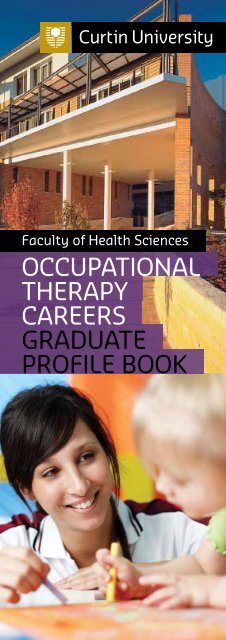
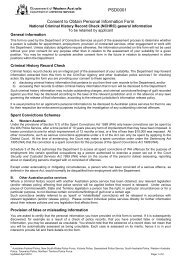
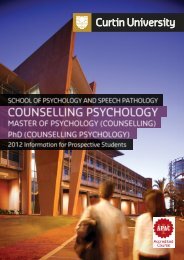
![Mental health commission report July 2010 - June 2011 [.pdf]](https://img.yumpu.com/50755705/1/184x260/mental-health-commission-report-july-2010-june-2011-pdf.jpg?quality=85)
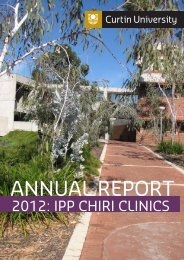
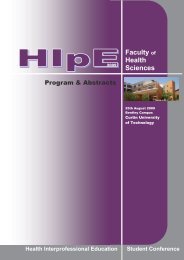
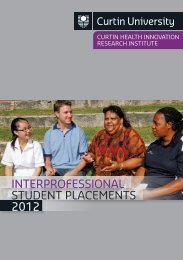
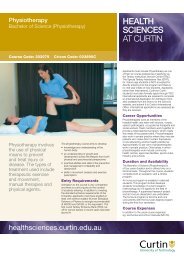
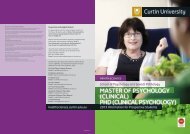
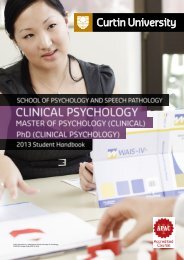

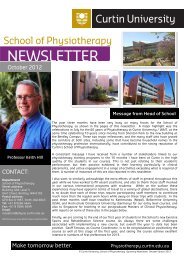
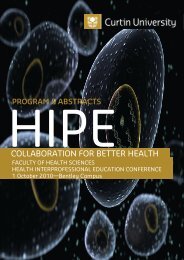
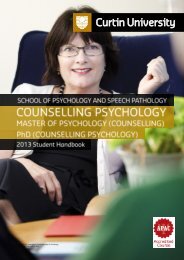
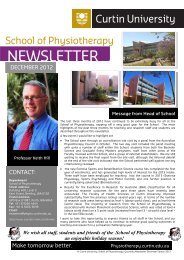
![2007 Annual Report [.pdf] - Health Sciences - Curtin University](https://img.yumpu.com/44476724/1/184x260/2007-annual-report-pdf-health-sciences-curtin-university.jpg?quality=85)